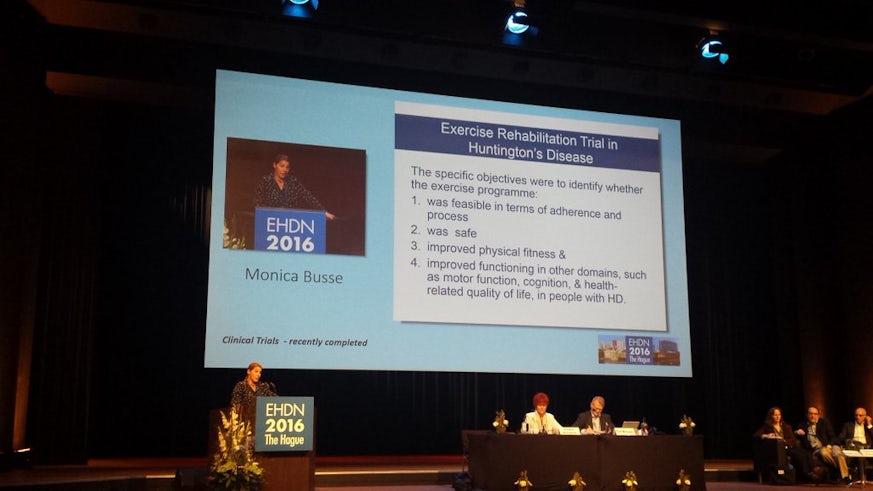Physical Activity in Huntington’s Disease #EHDN2016
2 Hydref 2016

In September 2016, the 9th European Huntington’s Disease Network (EHDN) plenary meeting 2016 took place at The Hague in the Netherlands.
Clinicians, scientists, researchers, HD patients and families travelled from all over the world to gather for four days of meetings, presentations, posters and networking. With over 900 attendees, EHDN 2016 provided a fantastic platform to learn about and share the ongoing work of EHDN members, including the research and engagement projects in HD. There were many opportunities to gain new knowledge, in particular of approaches to treatment and management of HD currently being explored. This was particularly true for the area of physiotherapy and physical activity in HD, and so this blog focusses on the exciting developments shared at EHDN 2016. The Active HD twitter feed was kept busy following these developments over the meeting; some examples can be seen in the figure EHDN 2016 in Tweets: @Active_HD.
Physiotherapy research
Monica Busse kicked off the chairing of the plenary session ‘Keeping Brain Cells Functioning- Targeting Neural Recovery and Replacement’, by giving a fascinating insight into future potential to combine therapies for better outcomes in HD. Physical activity is something that is available now, and could complement other therapies as they are developed. Pertinently, a popular comment of key note speakers and others at the plenary was that ‘we need to lock the basic scientists and clinicians in a room and make them talk to each other!’
Lori Quinn proceeded to present the evidence base in physiotherapy led studies with her presentation; ‘Can Exercise and Physical Therapy alter Disease Progression in Huntington’s Disease’. It is really only in recent years that the potential for physical activity benefit in HD has been explored in theoretically underpinned high quality randomised controlled trials. Obtaining funding and carrying out these trials has taken time. Indeed this was the first time at an EHDN plenary that physical activity stood out amongst other treatment approaches. The findings from recent physiotherapy research created a buzz of inspiration about the possibilities of physical activity for its potential benefit in HD. Not least, Monica Busse’s presentation of the first positive trial in HD world-wide was a fantastically proud moment for the team that led the international ExeRT-HD trial. This study demonstrated that a short-term exercise intervention is safe, feasible, and leads to significant improvements in fitness and motor function in people with HD.
A number of posters were presented, more details of ENGAGE-HD poster can be seen in the general blog about EHDN.
The EHDN Physiotherapy Working Group (PWG)

Prior to the official opening of the plenary the PWG met at the World Forum in The Hague. An objective of the PWG for the last 2 years has been to develop a freely accessible online resource to support people with HD to participate in physical activity. After much anticipation the resource was officially launched at the PWG and is now live. The resource is aimed at HD families and formal caregivers and provides helpful information, links to other useful resources, instructional videos, stories from HD families and formal caregivers. There was much excitement about this resource at the meeting and discussions for further development are under way…watch this space!
Amongst the posters presented by Centre for Trials Research and the Neuroscience and Mental Health Research Institute, a new functional screening tool for physiotherapists specific to HD was presented. Noit Inbar (Movement Disorders Unit, Tel-Aviv Sourasky Medical Center, Tel-Aviv, Israel), Monica Busse (Centre for Trials Research, Cardiff University), Katy Hamana (School of Healthcare Sciences, Cardiff University) and Lori Quinn (Teacher’s College, Colombia University) developed the screening which will be piloted in HD clinics around Europe and the USA.

A number of parallel breakfast sessions allowed attendees to choose topics of interest and relevance to them. In one of these sessions led by Ralf Reilmann entitled ‘Management of Motor phenotype’, physiotherapy was again highlighted. Dr Reilmann discussed physiotherapy intervention at early stages of HD, as early as possible, where balance and walking may be affected by symptoms. Those in the room (mainly clinicians by a show of hands) were directed to the Physiotherapy Guidance document developed by the Physiotherapy Working Group(PWG). The document was also praised as a good example of what EHDN working groups have the potential to do in terms of developing and disseminating work that can positively affect practice in HD.
An Olympian at EHDN!

In key note session ‘HD for me’ Sarah Winckless, gave a moving account of her experiences as an Olympic bronze medallist, and double World Champion, who rowed for Great Britain at three Olympic Games and six World Championships, in the context of being gene positive for HD.
The icing on the cake…
All in all, physical activity gained some good ‘air time’ at EHDN 2016. Great work that is going on around the world was highlighted, but it is still the case that large scale randomised controlled trials are the gold standard when it comes to clinical trials. To date, these are still lacking in exercise in HD… but the good news is, Cristina Sampaio (Chief clinical officer at CHDI) envisages that it is likely for phase III exercise trials in HD (in other words large scale) to be undertaken in the next 2 years!
#EHDN2016 in Tweets: @Active_HD


